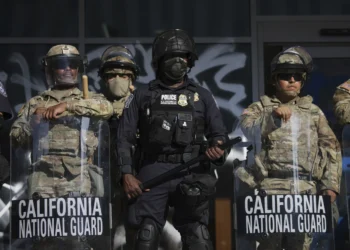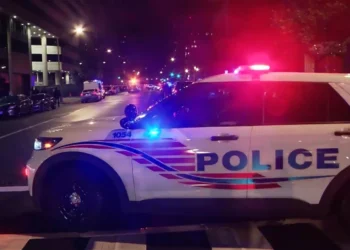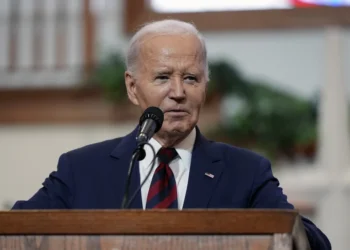“All we really needed was a new president,” Donald Trump said in March regarding the immigration crisis Joe Biden and Kamala Harris created and yet insisted they needed Congress to fix. Indeed, right from the get-go, Trump and his team, led by border czar Tom Homan, have effectively shut down the inflow of illegals across the southern border.
Thanks to, er, sometimes creative rationales and left-wing legal opposition made more effective by activist judges, deportations have proved far trickier.
In that context, White House Deputy Chief of Staff for Policy Stephen Miller recently opined that the administration is “actively looking at” suspending habeas corpus, which affords legal protection against illegal imprisonment. “The Constitution is clear — and that, of course, is the supreme law of the land — that the privilege of the writ of habeas corpus could be suspended in time of invasion,” Miller argued. “A lot of it depends on whether the courts do the right thing or not.”
In the true logical sense, that begs the question. In a circular reasoning fashion, it assumes an answer to “the right thing,” which is the very thing being debated.
Article I, Section 9 of the U.S. Constitution says, “The Privilege of the Writ of Habeas Corpus shall not be suspended, unless when in Cases of Rebellion or Invasion the public Safety may require it.” Notably, that’s in Article I, the part of the Constitution that lays out the powers and responsibilities of Congress, not the executive branch.
In other words, the president may request that Congress suspend habeas corpus, but even then, the conditions are set by the Constitution. Does the intentional invasion Biden unleashed at the border qualify legally as an invasion? Does public safety require the suspension?
When a couple of hundred folks tangled with Capitol Police and stormed the Capitol on January 6, Democrats laughably argued it was a literal insurrection that nearly toppled the U.S. government. They impeached Trump for it. Surely, then, 10-plus million illegals flooding the country and utterly crippling the immigration system qualifies as an invasion.
Unfortunately, that’s a far easier case to make rhetorically than legally. In fact, Trump’s stunning success in closing the border actually works against him in any court battle over habeas corpus. I.e., the invasion is over.
President Abraham Lincoln infamously suspended habeas corpus during the War Between the States. He argued that the Confederacy’s “rebellion” constitutionally justified it, though he applied it to citizens in the Union — and he lost in court before Congress eventually backed him up nearly two years later. Hot Air’s John Sexton recounts the three other times it was suspended, all with congressional approval:
- It was suspended by President U.S. Grant in 1871 in several counties of South Carolina to combat the KKK.
- It was suspended in the Philippines in 1905 during an insurrection.
- It was suspended in Hawaii in 1941 after the bombing of Pearl Harbor.
Each of those four times, there was a shooting war. That’s not the case now.
Even while begging the question, Miller’s caveat about courts doing “the right thing” acknowledges that suspending habeas corpus for illegals would be an uphill battle. The administration applied the 1798 Alien Enemies Act — used only three other times in history, all during times of war — to justify deporting members of a foreign terrorist gang and has largely been stymied by the courts. Just yesterday, U.S. District Judge Stephanie Haines became the first judge to uphold Trump’s use of this law; several others have blocked it.
More importantly, the Supreme Court gave Trump a temporary reprieve on using the law as cases work through lower courts, though all nine justices agreed that habeas corpus is part of the process for detention and removal of illegal aliens.
Given that the Supreme Court has already so ruled, Miller was likely just signaling how serious the administration is. It’s kind of like Trump promising to build a wall and make Mexico pay for it. “I don’t believe this is going to come to Congress,” said Wyoming Republican Senator John Barrasso. “What I believe is the president is going to follow the law.” Without Congress, the president has little recourse on habeas corpus.
As deportation proponent Rich Lowry argues, “It’s strange that the administration is reaching for dubious powers when it hasn’t pursued means that are unquestionably within its authority, especially extensive, forceful worksite enforcement to deny illegal immigrants jobs and punish those who employ them.”
It is, of course, utterly outrageous that millions of illegals skipped due process on the way in and now demand it before being shown the way out. The system is totally overwhelmed to the point of farce if every single illegal alien must be afforded a lengthy process of deportation hearings. It’s true that these are not military invaders. By and large, they came here to work. However, neither are they citizens, and the same rights and privileges don’t necessarily apply.
Surely, preserving our constitutional system can’t mean that millions can come in illegally, some of them giving birth to “citizen” children, and virtually all of them evade deportation.
If that’s the case, the constitutional order our Founders established is unrecognizably destroyed, and, as Trump has often said, we no longer have a country.

















